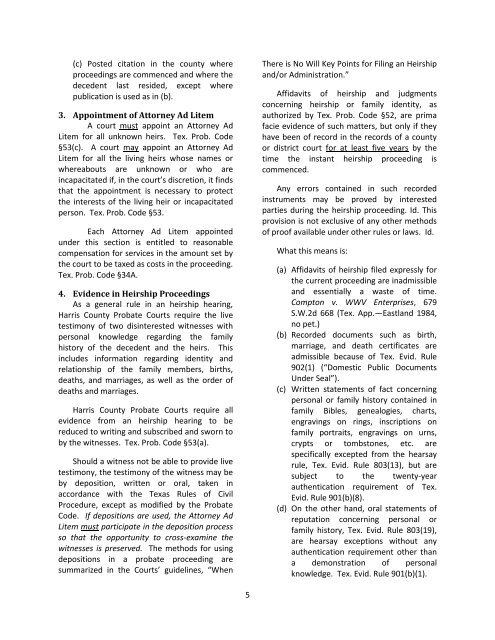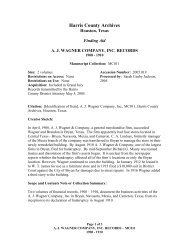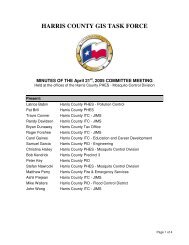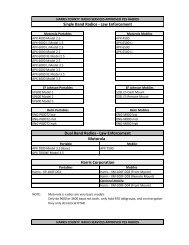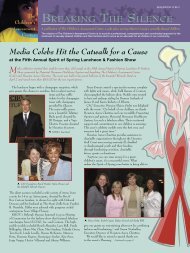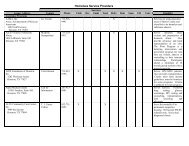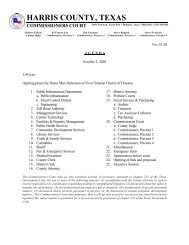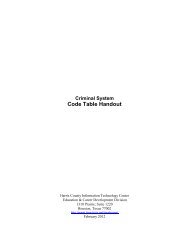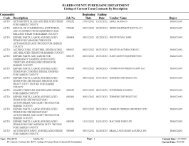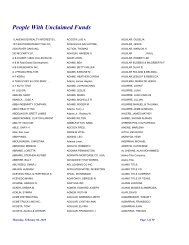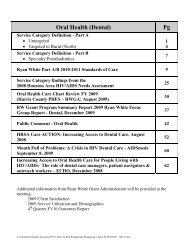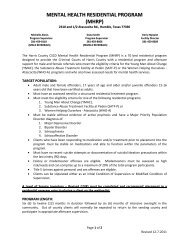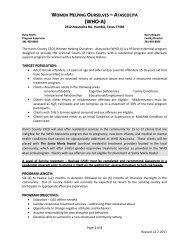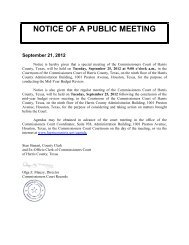Harris County Probate Courts The Ad Litem Manual for Heirship ...
Harris County Probate Courts The Ad Litem Manual for Heirship ...
Harris County Probate Courts The Ad Litem Manual for Heirship ...
You also want an ePaper? Increase the reach of your titles
YUMPU automatically turns print PDFs into web optimized ePapers that Google loves.
(c) Posted citation in the county where<br />
proceedings are commenced and where the<br />
decedent last resided, except where<br />
publication is used as in (b).<br />
3. Appointment of Attorney <strong>Ad</strong> <strong>Litem</strong><br />
A court must appoint an Attorney <strong>Ad</strong><br />
<strong>Litem</strong> <strong>for</strong> all unknown heirs. Tex. Prob. Code<br />
§53(c). A court may appoint an Attorney <strong>Ad</strong><br />
<strong>Litem</strong> <strong>for</strong> all the living heirs whose names or<br />
whereabouts are unknown or who are<br />
incapacitated if, in the court’s discretion, it finds<br />
that the appointment is necessary to protect<br />
the interests of the living heir or incapacitated<br />
person. Tex. Prob. Code §53.<br />
Each Attorney <strong>Ad</strong> <strong>Litem</strong> appointed<br />
under this section is entitled to reasonable<br />
compensation <strong>for</strong> services in the amount set by<br />
the court to be taxed as costs in the proceeding.<br />
Tex. Prob. Code §34A.<br />
4. Evidence in <strong>Heirship</strong> Proceedings<br />
As a general rule in an heirship hearing,<br />
<strong>Harris</strong> <strong>County</strong> <strong>Probate</strong> <strong>Courts</strong> require the live<br />
testimony of two disinterested witnesses with<br />
personal knowledge regarding the family<br />
history of the decedent and the heirs. This<br />
includes in<strong>for</strong>mation regarding identity and<br />
relationship of the family members, births,<br />
deaths, and marriages, as well as the order of<br />
deaths and marriages.<br />
<strong>Harris</strong> <strong>County</strong> <strong>Probate</strong> <strong>Courts</strong> require all<br />
evidence from an heirship hearing to be<br />
reduced to writing and subscribed and sworn to<br />
by the witnesses. Tex. Prob. Code §53(a).<br />
Should a witness not be able to provide live<br />
testimony, the testimony of the witness may be<br />
by deposition, written or oral, taken in<br />
accordance with the Texas Rules of Civil<br />
Procedure, except as modified by the <strong>Probate</strong><br />
Code. If depositions are used, the Attorney <strong>Ad</strong><br />
<strong>Litem</strong> must participate in the deposition process<br />
so that the opportunity to cross-examine the<br />
witnesses is preserved. <strong>The</strong> methods <strong>for</strong> using<br />
depositions in a probate proceeding are<br />
summarized in the <strong>Courts</strong>’ guidelines, “When<br />
5<br />
<strong>The</strong>re is No Will Key Points <strong>for</strong> Filing an <strong>Heirship</strong><br />
and/or <strong>Ad</strong>ministration.”<br />
Affidavits of heirship and judgments<br />
concerning heirship or family identity, as<br />
authorized by Tex. Prob. Code §52, are prima<br />
facie evidence of such matters, but only if they<br />
have been of record in the records of a county<br />
or district court <strong>for</strong> at least five years by the<br />
time the instant heirship proceeding is<br />
commenced.<br />
Any errors contained in such recorded<br />
instruments may be proved by interested<br />
parties during the heirship proceeding. Id. This<br />
provision is not exclusive of any other methods<br />
of proof available under other rules or laws. Id.<br />
What this means is:<br />
(a) Affidavits of heirship filed expressly <strong>for</strong><br />
the current proceeding are inadmissible<br />
and essentially a waste of time.<br />
Compton v. WWV Enterprises, 679<br />
S.W.2d 668 (Tex. App.—Eastland 1984,<br />
no pet.)<br />
(b) Recorded documents such as birth,<br />
marriage, and death certificates are<br />
admissible because of Tex. Evid. Rule<br />
902(1) (“Domestic Public Documents<br />
Under Seal”).<br />
(c) Written statements of fact concerning<br />
personal or family history contained in<br />
family Bibles, genealogies, charts,<br />
engravings on rings, inscriptions on<br />
family portraits, engravings on urns,<br />
crypts or tombstones, etc. are<br />
specifically excepted from the hearsay<br />
rule, Tex. Evid. Rule 803(13), but are<br />
subject to the twenty-year<br />
authentication requirement of Tex.<br />
Evid. Rule 901(b)(8).<br />
(d) On the other hand, oral statements of<br />
reputation concerning personal or<br />
family history, Tex. Evid. Rule 803(19),<br />
are hearsay exceptions without any<br />
authentication requirement other than<br />
a demonstration of personal<br />
knowledge. Tex. Evid. Rule 901(b)(1).


